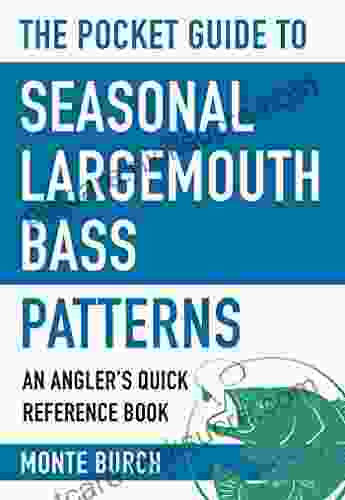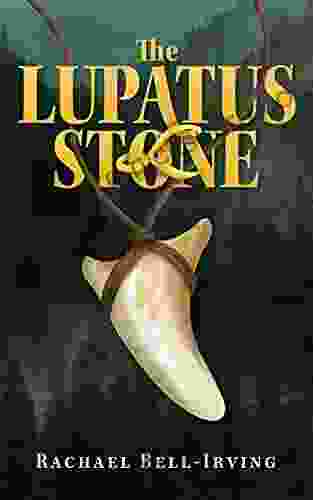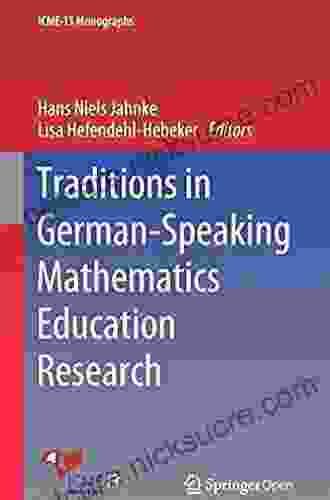Traditions in German-Speaking Mathematics Education Research: ICME-13 Monographs

5 out of 5
| Language | : | English |
| File size | : | 15917 KB |
| Text-to-Speech | : | Enabled |
| Screen Reader | : | Supported |
| Enhanced typesetting | : | Enabled |
| Word Wise | : | Enabled |
| Print length | : | 286 pages |
Mathematics education research in German-speaking countries has a long and rich history, dating back to the early 19th century. Over the years, a number of different theoretical and methodological approaches have been used to study mathematics education, and the field has undergone a number of significant changes. In this article, we will provide an overview of the traditions in German-speaking mathematics education research, as presented in the ICME-13 Monographs. We will discuss the historical development of the field, the different theoretical and methodological approaches that have been used, and the current state of the field.
Historical Development of Mathematics Education Research in Germany
The roots of mathematics education research in German-speaking countries can be traced back to the early 19th century, when a number of scholars began to study the teaching and learning of mathematics. One of the most influential figures in this early period was Friedrich Fröbel, who developed the concept of the kindergarten. Fröbel believed that children should be actively involved in their own learning, and he developed a number of games and activities to help them learn mathematics. Another influential figure in this period was Johann Pestalozzi, who developed a method of teaching mathematics that emphasized the use of concrete materials. Pestalozzi's method was widely adopted in Germany, and it had a significant impact on the development of mathematics education research in the country.
In the late 19th and early 20th centuries, a number of new theoretical and methodological approaches were introduced into mathematics education research in German-speaking countries. These approaches included the use of psychology, sociology, and philosophy to study mathematics education. One of the most influential figures in this period was Felix Klein, who was the director of the University of Göttingen from 1886 to 1913. Klein was a strong advocate for the use of mathematics in the teaching of mathematics, and he developed a number of new curricula and textbooks that were based on this approach. Klein's work had a significant impact on the development of mathematics education research in Germany, and it helped to establish the field as a legitimate academic discipline.
In the mid-20th century, mathematics education research in German-speaking countries underwent a number of significant changes. One of the most important changes was the of the "new math" movement. The new math movement was a reform movement that sought to introduce new and more rigorous mathematics into the school curriculum. The new math movement had a significant impact on mathematics education research in German-speaking countries, and it led to the development of a number of new curricula and textbooks. Another important change that occurred in the mid-20th century was the of computers into mathematics education research. Computers provided researchers with new tools to study the teaching and learning of mathematics, and they led to the development of a number of new research methods.
In the late 20th and early 21st centuries, mathematics education research in German-speaking countries has continued to develop and grow. There has been a growing emphasis on the use of mixed methods research, which combines qualitative and quantitative methods to study mathematics education. There has also been a growing interest in the use of technology to support mathematics learning. Today, mathematics education research in German-speaking countries is a vibrant and dynamic field, with a wide range of research topics being investigated. The field continues to be influenced by the traditions of the past, but it is also open to new ideas and approaches.
Theoretical and Methodological Approaches in German-Speaking Mathematics Education Research
A variety of theoretical and methodological approaches have been used in mathematics education research in German-speaking countries. These approaches can be broadly classified into two main categories: qualitative approaches and quantitative approaches. Qualitative approaches focus on the subjective experiences of individuals, while quantitative approaches focus on the objective measurement of variables. In recent years, there has been a growing emphasis on the use of mixed methods research, which combines qualitative and quantitative methods to study mathematics education.
Some of the most common qualitative approaches used in mathematics education research in German-speaking countries include:
Some of the most common quantitative approaches used in mathematics education research in German-speaking countries include:
5 out of 5
| Language | : | English |
| File size | : | 15917 KB |
| Text-to-Speech | : | Enabled |
| Screen Reader | : | Supported |
| Enhanced typesetting | : | Enabled |
| Word Wise | : | Enabled |
| Print length | : | 286 pages |
Do you want to contribute by writing guest posts on this blog?
Please contact us and send us a resume of previous articles that you have written.
 Fiction
Fiction Non Fiction
Non Fiction Romance
Romance Mystery
Mystery Thriller
Thriller SciFi
SciFi Fantasy
Fantasy Horror
Horror Biography
Biography Selfhelp
Selfhelp Business
Business History
History Classics
Classics Poetry
Poetry Childrens
Childrens Young Adult
Young Adult Educational
Educational Cooking
Cooking Travel
Travel Lifestyle
Lifestyle Spirituality
Spirituality Health
Health Fitness
Fitness Technology
Technology Science
Science Arts
Arts Crafts
Crafts DIY
DIY Gardening
Gardening Petcare
Petcare Taran Matharu
Taran Matharu Stacey Steinberg
Stacey Steinberg Mike Bender
Mike Bender Randall M Packard
Randall M Packard Ivana Bajic Hajdukovic
Ivana Bajic Hajdukovic Bob Allcorn
Bob Allcorn Bryn Huntpalmer
Bryn Huntpalmer Gill Stewart
Gill Stewart Matthew Harffy
Matthew Harffy Samantha Boardman
Samantha Boardman Rachael Bell Irving
Rachael Bell Irving Caroline Fidanza
Caroline Fidanza James Proctor
James Proctor Eryk Lewinson
Eryk Lewinson Andrew Evans
Andrew Evans Craig Clapper
Craig Clapper Julie K Briggs
Julie K Briggs 1st Ed 2020 Edition Kindle Edition
1st Ed 2020 Edition Kindle Edition Kara Goucher
Kara Goucher Sanjay Sarma
Sanjay Sarma Bill Douglas
Bill Douglas Ejike Ifeanyichukwu
Ejike Ifeanyichukwu Harry Fisch
Harry Fisch Christian Fader
Christian Fader Michael Clarke
Michael Clarke Joshua James
Joshua James Robert Lomas
Robert Lomas Joseph Mercola
Joseph Mercola Otto Toeplitz
Otto Toeplitz Rosemary Ellen Guiley
Rosemary Ellen Guiley Mark Santino
Mark Santino Os Guinness
Os Guinness Mark Miller
Mark Miller Knowledge Tree
Knowledge Tree Leona S Aiken
Leona S Aiken Ray Mcnulty
Ray Mcnulty Valerie Nash Chang
Valerie Nash Chang Thomas Lickona
Thomas Lickona Diana Papaioannou
Diana Papaioannou Helen Garabedian
Helen Garabedian Jerome Rand
Jerome Rand Gerd Gigerenzer
Gerd Gigerenzer Geraint Thomas
Geraint Thomas Philip Coppens
Philip Coppens John Small
John Small Michelle Damiani
Michelle Damiani Chris Parsons
Chris Parsons Anton Angelov
Anton Angelov Pam Jarvis
Pam Jarvis Dorthe Berntsen
Dorthe Berntsen Chris J Ellis
Chris J Ellis Florence Nightingale
Florence Nightingale Kim Dwinell
Kim Dwinell Andrea Sfiligoi
Andrea Sfiligoi Diane H Tracey
Diane H Tracey Dk Publishing
Dk Publishing Kay Kennedy
Kay Kennedy Jon Young
Jon Young Alan Naldrett
Alan Naldrett Jane Yeadon
Jane Yeadon William E Glassley
William E Glassley Stephen C Meyer
Stephen C Meyer Judith Warner
Judith Warner Fern Nichols
Fern Nichols Ronald York
Ronald York Russ Moorhouse
Russ Moorhouse Chad Waterbury
Chad Waterbury Elizabeth Heavey
Elizabeth Heavey Janice Hudson
Janice Hudson Edward A Bell
Edward A Bell Grace Liu
Grace Liu Nancy Hendrickson
Nancy Hendrickson 15th Edition Kindle Edition
15th Edition Kindle Edition Katie Singer
Katie Singer Brent E Turvey
Brent E Turvey James Ragonnet
James Ragonnet Adeline Yen Mah
Adeline Yen Mah Lawrence T Friedhoff
Lawrence T Friedhoff Steve Garratt
Steve Garratt Robert Milner
Robert Milner Gail Buckland
Gail Buckland Claire Dunn
Claire Dunn John S Farnam
John S Farnam Louise Warneford
Louise Warneford David I Spivak
David I Spivak Elaine Heney
Elaine Heney Richard Pears
Richard Pears Nicole Zasowski
Nicole Zasowski R K Agarwal
R K Agarwal Mary Douglas
Mary Douglas Natsuki Takaya
Natsuki Takaya David Roberts
David Roberts Daniel H Pink
Daniel H Pink Mark Seidenberg
Mark Seidenberg Brian Meier
Brian Meier Shalini Shankar
Shalini Shankar Guy Harrison
Guy Harrison Burt L Standish
Burt L Standish Orji Onyebuchi
Orji Onyebuchi Suzy Hopkins
Suzy Hopkins Ben Coates
Ben Coates Steve Crawford
Steve Crawford Clark A Campbell
Clark A Campbell Kristen Thrasher
Kristen Thrasher Tyler Lansford
Tyler Lansford Irene Spencer
Irene Spencer Webb Chiles
Webb Chiles M Susan Lindee
M Susan Lindee James M Tabor
James M Tabor Cathy Hester Seckman
Cathy Hester Seckman Maureen Dempsey
Maureen Dempsey Alan Agresti
Alan Agresti Launi Meili
Launi Meili Jack Newfield
Jack Newfield Day Schildkret
Day Schildkret Saroo Brierley
Saroo Brierley Ron Larson
Ron Larson Sara Saedi
Sara Saedi Sally A Lipsky
Sally A Lipsky Daniel Scott
Daniel Scott Dan Robson
Dan Robson Kajal Gupta
Kajal Gupta Jacob Gardner
Jacob Gardner Nicole Libin Phd
Nicole Libin Phd Traci Chee
Traci Chee Lisa Marasco
Lisa Marasco George Mount
George Mount Ann Jackson
Ann Jackson Mindfulness Hypnosis Academy
Mindfulness Hypnosis Academy Manjit Kumar
Manjit Kumar Jamil Zaki
Jamil Zaki Beryl Beare
Beryl Beare Pat Manley
Pat Manley Jody Morse
Jody Morse Robert Chu
Robert Chu Yaron Seidman
Yaron Seidman Desiree Trattles
Desiree Trattles Alexandra Kenin
Alexandra Kenin Ruth Ware
Ruth Ware Bob Chandler
Bob Chandler Robyn Hawkins
Robyn Hawkins Brian Fagan
Brian Fagan Amanda Claridge
Amanda Claridge H Lee Jones
H Lee Jones Ali Psiuk
Ali Psiuk John Toussaint
John Toussaint Cal Peternell
Cal Peternell Alexandre Paiva
Alexandre Paiva Jo Bartlett
Jo Bartlett Deborah T Goldberg
Deborah T Goldberg Jareth Tempest
Jareth Tempest Patricia G Lange
Patricia G Lange Carmen Acevedo Butcher
Carmen Acevedo Butcher Adam Rutherford Phd
Adam Rutherford Phd Neil Sagebiel
Neil Sagebiel Leonard Sax
Leonard Sax Robyn Perry Worthington
Robyn Perry Worthington Lori Bregman
Lori Bregman Philip Moore
Philip Moore Lech A Grzelak
Lech A Grzelak Emily Chetkowski
Emily Chetkowski Estelle Maskame
Estelle Maskame Brent Warner
Brent Warner Susan Ludington Hoe
Susan Ludington Hoe Paul Annacone
Paul Annacone Karen L Cox
Karen L Cox Janet Malcolm
Janet Malcolm Paul Johnson
Paul Johnson Bruce Brown
Bruce Brown Editions La Plume D Eros
Editions La Plume D Eros John Vigor
John Vigor Nageshwar Sah
Nageshwar Sah Michael Archer
Michael Archer Joan Ryan
Joan Ryan Emily Vikre
Emily Vikre Dana Trentini
Dana Trentini Hana Ali
Hana Ali Graham Priest
Graham Priest Mildred Council
Mildred Council 1st Edition Kindle Edition
1st Edition Kindle Edition Dierdre Wolownick Honnold
Dierdre Wolownick Honnold Rollo Tomassi
Rollo Tomassi S Elia
S Elia Charlotte Eliopoulos
Charlotte Eliopoulos Christian Straube
Christian Straube Lisa R Cohen
Lisa R Cohen Terry Pratchett
Terry Pratchett Nancy B Rapoport
Nancy B Rapoport Christine E Sleeter
Christine E Sleeter Lynne Tolley
Lynne Tolley Bruce Chatwin
Bruce Chatwin Forrest Willett
Forrest Willett Harold Simmons
Harold Simmons Intelligent
Intelligent Anthony Haynes
Anthony Haynes Jim Baggott
Jim Baggott Richard Hofstadter
Richard Hofstadter Mambo Chita Tann
Mambo Chita Tann Nick Redfern
Nick Redfern David Clark
David Clark Vikas Bhushan
Vikas Bhushan Sarah A Clark
Sarah A Clark Skylar Kergil
Skylar Kergil Janice K Ledford
Janice K Ledford The Lodge Company
The Lodge Company Jeanne Oliver
Jeanne Oliver Livy
Livy Peter Burns
Peter Burns Jean Yves Leloup
Jean Yves Leloup Frank Wilczek
Frank Wilczek House Of Talent
House Of Talent Nick Morrison
Nick Morrison Kathy Farrokhzad
Kathy Farrokhzad Lenora Chu
Lenora Chu R J Vickers
R J Vickers Chris Stringer
Chris Stringer Ian Stewart
Ian Stewart Heather A Smith
Heather A Smith Wendy Higgins
Wendy Higgins Raymond Arsenault
Raymond Arsenault Jay Cassell
Jay Cassell Liz Thomas
Liz Thomas Rana Conway
Rana Conway Joachim Rossberg
Joachim Rossberg 1st Ed 2017 Edition Kindle Edition
1st Ed 2017 Edition Kindle Edition Ashley Stanford
Ashley Stanford Julia Rutland
Julia Rutland Dylan Dethier
Dylan Dethier Robin Hobb
Robin Hobb Naomi Moriyama
Naomi Moriyama Tillie Cole
Tillie Cole Stephen Bodio
Stephen Bodio Jandy Nelson
Jandy Nelson Glenda Green
Glenda Green Robert Irwin
Robert Irwin Daniel Todd Gilbert
Daniel Todd Gilbert Botros Rizk
Botros Rizk Sean Fitz Gerald
Sean Fitz Gerald Irina Szmelskyj
Irina Szmelskyj Rachel Reed
Rachel Reed David Wolff
David Wolff Taylor Fontenot
Taylor Fontenot Diane Vaughan
Diane Vaughan Sarah Lawton
Sarah Lawton Scott Matthews
Scott Matthews Sarah A Reinhard
Sarah A Reinhard Peter Lightbown
Peter Lightbown Alice Roberts
Alice Roberts Robert Lanza
Robert Lanza Wolfgang Jank
Wolfgang Jank Jay Carter
Jay Carter Nathan D Lang Raad
Nathan D Lang Raad Darril Fosty
Darril Fosty Jacob Cohen
Jacob Cohen Mark Lattanzi
Mark Lattanzi Loudell F Snow
Loudell F Snow Jeremy Lent
Jeremy Lent Shane Benzie
Shane Benzie Eric Sevareid
Eric Sevareid David Weber
David Weber Dinah Bucholz
Dinah Bucholz Bill Rodgers
Bill Rodgers Anne Polli
Anne Polli Jeff Benedict
Jeff Benedict Keith Bowden
Keith Bowden Monte Burch
Monte Burch M L Buchman
M L Buchman Joanne Calderwood
Joanne Calderwood D James Benton
D James Benton Larry Kaniut
Larry Kaniut Phyllis Franklin
Phyllis Franklin Raven Morgaine
Raven Morgaine Laura Prepon
Laura Prepon Mayim Bialik
Mayim Bialik Christa Mackinnon
Christa Mackinnon Roger Frampton
Roger Frampton Geoff Johns
Geoff Johns Kiley Reid
Kiley Reid Franz Boas
Franz Boas My Daily German
My Daily German Derek Rowntree
Derek Rowntree Jacqueline Corricelli
Jacqueline Corricelli Derald Wing Sue
Derald Wing Sue David Kahn
David Kahn Tim Hollister
Tim Hollister Karina Manta
Karina Manta Michael R Canfield
Michael R Canfield Michele Smith
Michele Smith Lars Anderson
Lars Anderson Ivor Horton
Ivor Horton Jean Pierre De Caussade
Jean Pierre De Caussade Ben Rothenberg
Ben Rothenberg Morten H Christiansen
Morten H Christiansen David Faulkner
David Faulkner Ellie Marney
Ellie Marney Christopher Hook
Christopher Hook 1st Ed 2019 Edition Kindle Edition
1st Ed 2019 Edition Kindle Edition Robyn Ryle
Robyn Ryle Alison Gopnik
Alison Gopnik Gerald Beaudry
Gerald Beaudry Mae Ilami Onyekwum
Mae Ilami Onyekwum Mike Barrett
Mike Barrett Sara Snow
Sara Snow Erin Miller
Erin Miller Tadahiko Mizuno
Tadahiko Mizuno Gary Dierking
Gary Dierking Belinia Xenrale
Belinia Xenrale Mara Rutherford
Mara Rutherford Didier Reiss
Didier Reiss Monica Beyer
Monica Beyer Larry A Yff
Larry A Yff Jamie Dorobek
Jamie Dorobek Brad Myers
Brad Myers Jesse M Ehrenfeld
Jesse M Ehrenfeld Edward Marston
Edward Marston Karen Kovacs
Karen Kovacs Aron Ralston
Aron Ralston 6th Edition Kindle Edition
6th Edition Kindle Edition Evelyn Raab
Evelyn Raab Spire Study System
Spire Study System Marva Collins
Marva Collins Hannu Rajaniemi
Hannu Rajaniemi Sharon Wilkins
Sharon Wilkins Timothy Dickeson
Timothy Dickeson Alan Greenfield
Alan Greenfield Modestus Anabaraonye
Modestus Anabaraonye Deborah Spungen
Deborah Spungen Daisaku Ikeda
Daisaku Ikeda Peter Hessler
Peter Hessler Bradmd
Bradmd Erfun Geula
Erfun Geula Berkshire K Greene
Berkshire K Greene Tamonya Sands
Tamonya Sands Rick Barba
Rick Barba Joyce L Vedral
Joyce L Vedral Lavinia Collins
Lavinia Collins Stephen R Lawhead
Stephen R Lawhead Cathy Raubenheimer
Cathy Raubenheimer Mike Lanza
Mike Lanza Alexandra Witze
Alexandra Witze Wendy Sullivan
Wendy Sullivan Jacob Stegenga
Jacob Stegenga Megan Sloan
Megan Sloan Tom Chivers
Tom Chivers Denis Dwyer
Denis Dwyer Linda L French
Linda L French Karl Rehn
Karl Rehn Andrea Olson
Andrea Olson Patricia B Mcconnell
Patricia B Mcconnell Sharon Copeland
Sharon Copeland Gary E Schwartz
Gary E Schwartz Nicholas J Saunders
Nicholas J Saunders Amanda Kingloff
Amanda Kingloff Ian Sample
Ian Sample Timothy R Pauketat
Timothy R Pauketat Teri Tom
Teri Tom Rebecca Solnit
Rebecca Solnit Michael Schiavone
Michael Schiavone Will Nett
Will Nett Richard E Nisbett
Richard E Nisbett 1st Ed 2016 Edition Kindle Edition
1st Ed 2016 Edition Kindle Edition Anthony Burgess
Anthony Burgess Tim Deroche
Tim Deroche David Barrett
David Barrett Carol Matsuzaki
Carol Matsuzaki Kyler Shumway
Kyler Shumway George Grimm
George Grimm Laura Luther
Laura Luther Natalia Molina
Natalia Molina Maia Motley
Maia Motley Barry Ord Clarke
Barry Ord Clarke Ashlee Kasten
Ashlee Kasten Latham Thomas
Latham Thomas Asti Hustvedt
Asti Hustvedt Egerton Ryerson Young
Egerton Ryerson Young Tim Powers
Tim Powers Ric Conrad
Ric Conrad Michael T Mcdermott
Michael T Mcdermott Adam Cesare
Adam Cesare Daniel L Schacter
Daniel L Schacter Christopher Carter
Christopher Carter Felicity Cloake
Felicity Cloake Rebekah Dodson
Rebekah Dodson Michael Borenstein
Michael Borenstein Gary M Schultheis
Gary M Schultheis Hafsah Faizal
Hafsah Faizal Teddy Atlas
Teddy Atlas Matthew Dworak
Matthew Dworak Amita Jassi
Amita Jassi Michael Ross
Michael Ross Wabun Wind
Wabun Wind Sophie Kinsella
Sophie Kinsella Piotr Naskrecki
Piotr Naskrecki Lou Nanne
Lou Nanne Bilingual Edition Kindle Edition
Bilingual Edition Kindle Edition T M Mikita
T M Mikita Larry Krieger
Larry Krieger Dr Mike Grevlos
Dr Mike Grevlos Jamie Whyte
Jamie Whyte Kathleen Buckstaff
Kathleen Buckstaff Travis Senzaki
Travis Senzaki Joshua G Shifrin
Joshua G Shifrin Mike Chappell
Mike Chappell Six Sisters Stuff
Six Sisters Stuff David Fine
David Fine Elise Hennessy
Elise Hennessy Arny Alberts
Arny Alberts Clifford E Trafzer
Clifford E Trafzer 1st Ed 2021 Edition Kindle Edition
1st Ed 2021 Edition Kindle Edition Xiufeng Liu
Xiufeng Liu Seth Tucker
Seth Tucker Disha Experts
Disha Experts Chip Ingram
Chip Ingram Vaclav Smil
Vaclav Smil Joshua Darwin
Joshua Darwin Sarah Thompson
Sarah Thompson Keshia A Case
Keshia A Case Rafael Nadal
Rafael Nadal Ukay J Ekong
Ukay J Ekong Duncan Hamilton
Duncan Hamilton Raichelle Carter
Raichelle Carter Amanda Brooks
Amanda Brooks Andy Kirkpatrick
Andy Kirkpatrick Samuel Owedyk
Samuel Owedyk Susan Alcorn
Susan Alcorn Lani Forbes
Lani Forbes Harvey Penick
Harvey Penick Fletcher Dunn
Fletcher Dunn James Adams
James Adams S K Gupta
S K Gupta Aaron T Beck
Aaron T Beck Holly Hook
Holly Hook Janet Godwin
Janet Godwin Isa Herrera
Isa Herrera Jacqueline Carey
Jacqueline Carey Jonathan Vaughters
Jonathan Vaughters Paul Freedman
Paul Freedman Karyn Garvin
Karyn Garvin Peter Heller
Peter Heller Carola Hein
Carola Hein Andrew Solomon
Andrew Solomon Ann Olga Koloski Ostrow
Ann Olga Koloski Ostrow Jeffrey S Saltz
Jeffrey S Saltz Elizabeth Becker
Elizabeth Becker Leonie Mack
Leonie Mack Charles Fleming
Charles Fleming Francis L Macrina
Francis L Macrina Norman Delgado
Norman Delgado Lh Press
Lh Press Arden Rose
Arden Rose Helen Batten
Helen Batten Jeremy Bhandari
Jeremy Bhandari Evy Poumpouras
Evy Poumpouras Alison Pray
Alison Pray Broccoli Lion
Broccoli Lion R I Chalmers
R I Chalmers Perre Coleman Magness
Perre Coleman Magness John L Havlin
John L Havlin Geoff Powter
Geoff Powter Carol Lynn Mckibben
Carol Lynn Mckibben Hesam Nemounehkhah
Hesam Nemounehkhah Alice Waters
Alice Waters Kev Reynolds
Kev Reynolds J F Tamayo
J F Tamayo Julie Angus
Julie Angus Pam Vredevelt
Pam Vredevelt Alex Hibbert
Alex Hibbert Lei Wang
Lei Wang Matthew B Crawford
Matthew B Crawford John T Cacioppo
John T Cacioppo Jonathan Tarbox
Jonathan Tarbox Kim Mack Rosenberg
Kim Mack Rosenberg Paul Haddad
Paul Haddad Stanley Vast
Stanley Vast Jill Heinerth
Jill Heinerth Bud Hasert
Bud Hasert Elizabeth Field
Elizabeth Field Philippa Langley
Philippa Langley Doug Degrood
Doug Degrood Phil Mickelson
Phil Mickelson 1st Ed 2018 Edition Kindle Edition
1st Ed 2018 Edition Kindle Edition Sandra Uwiringiyimana
Sandra Uwiringiyimana Paul A Laviolette
Paul A Laviolette Mark Vee John
Mark Vee John Marisa Kanter
Marisa Kanter Jason Sumner
Jason Sumner Shane Jones
Shane Jones Felicia Pizzonia
Felicia Pizzonia Guillermo Gonzalez
Guillermo Gonzalez Paul Gaskell
Paul Gaskell Robert Clifton Robinson
Robert Clifton Robinson Leslie Anthony
Leslie Anthony Pete Magill
Pete Magill Kaoru Sinozaki
Kaoru Sinozaki Robert Oerter
Robert Oerter Ewan Mcgregor
Ewan Mcgregor Zachary Willey
Zachary Willey Lindsey Bliss
Lindsey Bliss
Light bulbAdvertise smarter! Our strategic ad space ensures maximum exposure. Reserve your spot today!
 Tony CarterFollow ·12.9k
Tony CarterFollow ·12.9k Jerome PowellFollow ·6.6k
Jerome PowellFollow ·6.6k Kazuo IshiguroFollow ·11.7k
Kazuo IshiguroFollow ·11.7k Camden MitchellFollow ·9.8k
Camden MitchellFollow ·9.8k Glen PowellFollow ·2.7k
Glen PowellFollow ·2.7k Federico García LorcaFollow ·11.6k
Federico García LorcaFollow ·11.6k Jaime MitchellFollow ·19.3k
Jaime MitchellFollow ·19.3k Isaac AsimovFollow ·12.6k
Isaac AsimovFollow ·12.6k

 Marcus Bell
Marcus BellThe Essential Guide to Angler Quick Reference: Your...
Embark on an unforgettable...

 Juan Butler
Juan ButlerThe Lupatus Stone: A Wicked Conjuring
The Lupatus Stone is a...

 Alvin Bell
Alvin BellUnveiling the Enchanting Memoirs of Lady Hyegyong: A...
In the annals of Korean...

 DeShawn Powell
DeShawn PowellAMC's Best Day Hikes in the Berkshires: Explore Majestic...
The Berkshires, a...

 Clark Campbell
Clark CampbellRewilding The Urban Soul: Reconnecting with Nature in the...
In the heart of sprawling metropolises, where...

 Cruz Simmons
Cruz SimmonsHow to Find Your Family History on a Genealogy Website: A...
Delving into the...
5 out of 5
| Language | : | English |
| File size | : | 15917 KB |
| Text-to-Speech | : | Enabled |
| Screen Reader | : | Supported |
| Enhanced typesetting | : | Enabled |
| Word Wise | : | Enabled |
| Print length | : | 286 pages |












